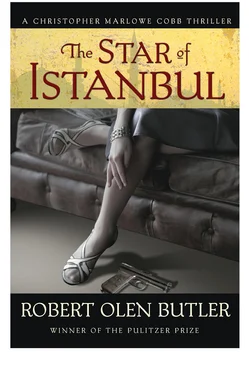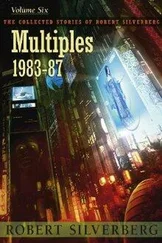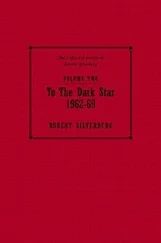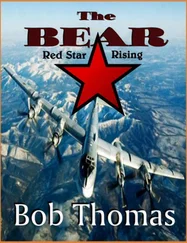We pushed through the eight-paneled doors and stepped out onto the porch, and we stopped in its deep shadow.
He offered me a cigarette and we lit up and blew some smoke into the sooty London night air.
My loyal taxi was sitting at the near curb, a couple of automobile lengths north, at which, after our second, silent puff, Smith nodded. “Is that yours?” he said.
“Yes. Good man. Been with me through a lot tonight.”
Smith grunted. Then he asked a question about a thing I kept forgetting and he’d apparently waited for us to be alone to ask. He nodded toward my shirt, down near the belt line. The blood. I’d forgotten it again. “Is that yours?” he asked.
“Nope.”
He grunted again and took another drag on his Fatima. He said, “Metcalf’s somewhere out in the Irish Sea about now, but I’m to wire him at Holyhead if I hear from you.”
“Sounds like serious worry.”
“Of course.”
“Like you expected me to be dead.”
“That’s always our expectation.”
“You from Chicago?” I asked, trying to compliment him on his straight talk, though I realized he might not know what I was referring to.
But maybe he did. “You from Cleveland?” he answered, which was a curve ball that dropped in for a strike.
“Nope,” I said.
“Nope,” he said. “But thanks for thinking I might be.”
“I’ll give you the key to the city sometime,” I said.
“First you got to dine with the boss,” he said.
“Okay.”
“Good pudding for you, Kit Cobb.”
“Yeah?”
“He likes swank food. Carlton Hotel at six. Escoffier’s joint.”
“I’ll think of it as a last meal,” I said.
The next day I had a fine morning and afternoon at the Arundel doing what I tried to convince myself I still primarily did. I wrote newspaper stories. I finally finished a follow-up feature about life after having a steamship sunk out from under you. I curved and faded and even plausibly made up some of that one, seeing as my life after the sinking had some atypical and secret elements to it. Which was okay, since second-day, stretch-it-out-no-matter-what-it-takes stories after very big ones often were full of curves and fadeaways and lies, and it was just something you lived with as a reporter and you figured the Joes on the street who read you didn’t give a damn about that anyway, if the story was good. And I also wrote a pretty damn fine authentic eyewitness story about a Zeppelin raid on London. I got those telegraphed off and had a good hot bath, seeing as the blood of the Hun had seeped on through the shirt and also colored Kit Cobb. Though a little water cleared me of that deed just fine.
When I got out of the tub there was a knock on the door. I wrapped a towel around me and I went to the door, but I didn’t open it at once.
“Yes?” I said.
“Bellhop, Mr. Cobb. I have a parcel for you.” It was a thin, reedy voice, almost adolescent, and I remembered the bellhop on duty tonight looking very young.
I opened the door.
It was the bellhop.
And inside the parcel was a tuxedo and a note from Metcalf. Wear this. But watch your cigarette ash. It’s a rental.
So I got duded up in my monkey suit and went out in a taxicab to the Carlton Hotel, which seemed just like the place for Metcalf, since it was cut out of the same pâte pâtisserie as his embassy, with French Second Empire pavilion roofs and high mansards, and with a green slate dome foamed up on top to boot.
Metcalf was waiting in the vestibule inside the front doors on Pall Mall.
He brightened at the sight of me coming through, the fleshy wheatiness of him now a harmonious part of his decor, draped bespokenly as it was in the black and white of his tux.
He stepped to me and offered his hand, greeting me in full moniker, though he sounded devoid of irony, almost admiring: “Christopher Marlowe Cobb.”
I shook the hand. “Gentleman Jim Metcalf,” I said, also without irony.
He laughed. “My element, here,” he said. “I have good food for you.”
“And some information?” I said, a little regretful at once for pushing the business when he wanted to push the eats.
He took it in stride, the smile never faltering. “Of course,” he said. “In due time.”
He led me into an inner quadrangle that suddenly made London — given the central lobby experience at the Waldorf as well — seem to be as enchanted with palm trees as Mexico City. Here was another Palm Court, covered over in a glass roof and full of trees and green-cane easy chairs.
We brisked through and then up a wide marble staircase and into a clotted-cream-colored restaurant with garlands of gold leaves on the ceiling and cut-glass chandeliers wired for a softly glowing electricity. Beneath us was a densely soft claret carpet upon which a man in tails glided soundlessly to us and bowed stiffly at the waist. “Mr. Metcalf,” he said. “Right this way.”
And so we ended up in a secluded far corner of the culinary home of the Cy Young of chefs, Georges Auguste Escoffier, whose eminence I already knew even before Metcalf dropped his voice into a reverential hush and made the case for him in somewhat different terms, Metcalf being a guy who knew his food. I took only some of this in — though the food itself would shortly make me pay more attention — but for now I had my mission heavy on my mind.
Metcalf stopped talking abruptly and smiled up at the waiter who had just arrived, not with a menu — I learned that we were in Maestro Escoffier’s hands, for seventeen courses — but with Caviar Oeufs de Pluvier —caviar arranged spillingly from the eggs of a plover as if the fertility of a bird was expressing the fertility of a fish. I was intrigued by all this but took the occasion of Metcalf’s silence to say, “Am I going to follow them?”
Meaning Brauer and Bourgani.
He well knew who I meant, but he ignored me and nodded a thank you to the waiter and he leaned forward over his plate. I thought at first that he was saying a silent grace, but his nostrils were flaring, delicately but purposefully, and I understood Metcalf to be — for all his gentlemanliness and professionalism — a sensualist and not a religionist. He said, without looking up from the eggs upon eggs, “Didn’t you tell Mr. Smith that you intended to treat this like a last meal?”
“I did.”
“I myself have come to treat every meal that way,” Metcalf said, and he turned his face to me now for the first time since I’d breached the protocol of the repas du connaisseur . He smiled a complex little smile, part of which was “What a pleasant but stupid child” and part of which, I suspected, was “Given the job you’ve signed up for, you better be serious about the last-meal stuff.”
But I answered his words: “Even with your desk job?”
This caught him a bit off guard. The smile disappeared. But nothing unpleasant took its place. He shrugged and said, “One can get hit by a taxi on a London street.”
Okay, I thought. I was in this whole thing with Metcalf, however he wanted to play it. He knew what I needed. So I broke off our conversation and I leaned over my caviar and flared my nostrils to the saltwater low-tide smell of animal fertility.
And we were silent when we were eating and consciously made only small talk when we weren’t, going through a Consommé aux Pommes d’Amour, the “apples of love” in this case turning out to be a very different view of a damn sweet Illinois tomato; and egg-shaped dumplings of Rouen duck ground up and whipped up with egg whites and with spit from a swift’s nest, a thing I was happy not to have known about as I ate it; and a dish that wedded crayfish and a hot pepper cream, which would have gone over pretty well in my birth city of New Orleans; and a course of baby chicken roughed up by ground pepper; and a frogs’ legs course, with lowly frogs not sounding quite up to this kind of treatment, so Escoffier renamed these creatures nymphes, which was an unsettling leap of imagination, as these naked legs were arrayed on our square plates flushed pink with paprika. I figured that guy Freud would have a field day with the maestro’s dreams.
Читать дальше












